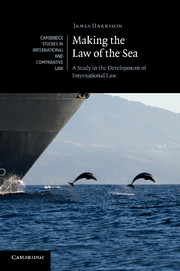Book contents
- Frontmatter
- Contents
- Acknowledgements
- Table of treaties
- Table of cases
- Abbreviations
- 1 Making the modern law of the sea: challenges and opportunities
- 2 The United Nations Convention on the Law of the Sea
- 3 Amendment and modification of the Law of the Sea Convention by the States Parties
- 4 Implementing agreements
- 5 Developments in the deep seabed mining regime
- 6 The International Maritime Organization and the international regulation of shipping
- 7 The contribution of the Food and Agriculture Organization to international fisheries law
- 8 Cooperation, coordination and conflict between international institutions
- 9 Conclusion
- Bibliography
- Index
- CAMBRIDGE STUDIES IN INTERNATIONAL AND COMPARATIVE LAW
8 - Cooperation, coordination and conflict between international institutions
Published online by Cambridge University Press: 03 May 2011
- Frontmatter
- Contents
- Acknowledgements
- Table of treaties
- Table of cases
- Abbreviations
- 1 Making the modern law of the sea: challenges and opportunities
- 2 The United Nations Convention on the Law of the Sea
- 3 Amendment and modification of the Law of the Sea Convention by the States Parties
- 4 Implementing agreements
- 5 Developments in the deep seabed mining regime
- 6 The International Maritime Organization and the international regulation of shipping
- 7 The contribution of the Food and Agriculture Organization to international fisheries law
- 8 Cooperation, coordination and conflict between international institutions
- 9 Conclusion
- Bibliography
- Index
- CAMBRIDGE STUDIES IN INTERNATIONAL AND COMPARATIVE LAW
Summary
The problem of fragmentation in international law-making
Previous chapters have demonstrated the range and variety of international organizations and institutions that are involved in developing the law of the sea regime at the global level. Each institution has a distinct membership, as well as a specific mandate defining the range of issues that fall within its sphere of competence. This has been called the principle of speciality by the International Court of Justice:
The Court need hardly point out that international organizations are subjects of international law which do not, unlike States, possess a general competence. International organizations are governed by the “principle of speciality,” that is to say, they are invested by the States which create them with powers, the limits of which are a function of the common interests whose promotion those States entrust to them.
The specialization of international organizations brings with it certain benefits. For instance, Hafner explains that “specialization accommodates various needs and concerns of the states engaged in international law-making, and states perceive that their individual positions are better respected in these special regimes than in a global one.” Moreover, specialized organizations can offer expertise in a specific area, which can be important when dealing with technical issues.
Yet the creation of specialized international organizations, institutions and regimes may also lead to the potential fragmentation of international law. Fragmentation is not a new phenomenon. Writing in 1953, Wilfred Jenks observed that:
law-making treaties are tending to develop in a number of historical, functional and regional groups which are separate from each other and whose mutual relationships are in some respects analogous to those of separate systems of municipal law.
- Type
- Chapter
- Information
- Making the Law of the SeaA Study in the Development of International Law, pp. 237 - 277Publisher: Cambridge University PressPrint publication year: 2011



